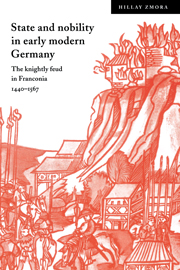Book contents
- Frontmatter
- Contents
- List of figures
- List of tables
- Preface
- List of abbreviations
- 1 The problem of the feud
- 2 The politics of violence: feuding in late medieval Franconia
- 3 The Franconian nobility
- 4 Prosopography of feuding noblemen
- 5 State, nobility, and lordship: the feud interpreted
- 6 The decline of the feud
- A note on Appendixes
- Appendix A Creditors and guarantors of the margraves of Brandenburg
- Appendix B Sample of intermarriages among the noble élite
- Appendix C Individual parameters of feuders (Sample-I)
- Appendix D Family parameters of feuders (Sample-I)
- Appendix E Individual parameters of feuders (Sample-II)
- Appendix F Family parameters of feuders (Sample-II)
- Sources of information for Appendix A
- Sources of Information for Appendixes C and D
- Sources of Information for Appendixes E and F
- Selected bibliography
- Index
- CAMBRIDGE STUDIES IN EARLY MODERN HISTORY
5 - State, nobility, and lordship: the feud interpreted
Published online by Cambridge University Press: 29 October 2009
- Frontmatter
- Contents
- List of figures
- List of tables
- Preface
- List of abbreviations
- 1 The problem of the feud
- 2 The politics of violence: feuding in late medieval Franconia
- 3 The Franconian nobility
- 4 Prosopography of feuding noblemen
- 5 State, nobility, and lordship: the feud interpreted
- 6 The decline of the feud
- A note on Appendixes
- Appendix A Creditors and guarantors of the margraves of Brandenburg
- Appendix B Sample of intermarriages among the noble élite
- Appendix C Individual parameters of feuders (Sample-I)
- Appendix D Family parameters of feuders (Sample-I)
- Appendix E Individual parameters of feuders (Sample-II)
- Appendix F Family parameters of feuders (Sample-II)
- Sources of information for Appendix A
- Sources of Information for Appendixes C and D
- Sources of Information for Appendixes E and F
- Selected bibliography
- Index
- CAMBRIDGE STUDIES IN EARLY MODERN HISTORY
Summary
In late 1462 Bishop Georg of Bamberg forbade Christoph Fuchs to graze his sheep in the marches of Niederhaide. Fuchs, who claimed he held the sheep-run in fee from the bishop of Wurzburg, refused to comply with the directive. The incident led to a feud, the feud to a war between the bishops of Bamberg and Würzburg. Lorenz Fries, who chronicled these events, estimated the annual income from Fuchs's sheep-run at three gulden. He concluded that ‘this was the beautiful Helen over which the two princes … went to a veritable Trojan War’. Fries knew better, and his classical associations fail to come to grips with the realities of late medieval feud and war. Why would a nobleman risk a feud against a prince for a property yielding such a paltry revenue? Why would such a seemingly trivial episode develop into an internecine war between princes? The Iliad provides no adequate explanation.
The main difficulty involved in accounting for the causes of feuds is that, as Otto Brunner pointed out long ago, feuds were an integral part of the political process and inhered in the very fabric of German society. As such, they bring into sight a form of interaction in which diverse motives and roles were acted out and on which divergent expectations converged. Accordingly, the variety of issues over which feuds broke out appears at first glance so wide as to defy systematisation: castles, forests, jurisdictions, fishponds, sheep-runs, hunting-grounds, subject peasants, rents and dues, tithes, outstanding debts, dowries, even cathedral chapter prebends.
- Type
- Chapter
- Information
- State and Nobility in Early Modern GermanyThe Knightly Feud in Franconia, 1440–1567, pp. 87 - 121Publisher: Cambridge University PressPrint publication year: 1998

